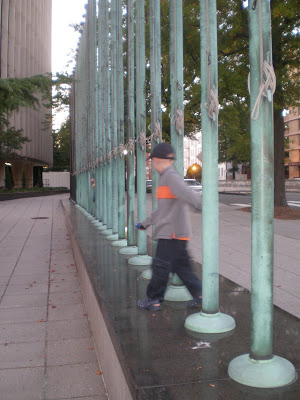Saturday, October 13, 2018
Tonight's picture was taken in October of 2008. Mattie was two months into treatment, but it was before his first limb salvaging surgery. Which was why Mattie was moving around like a typical child. These flag poles are near where we live. In fact, whenever I pass them now on a walk, I am immediately transported back to this moment in time. A time when Mattie was walking and loved to weave between each of the poles.
Quote of the day: Children are not just smaller, softer adults, and the differences matter for their treatment. ~ Kurt Newman
A friend of mine sent me an article entitled, Healing children': A surgeon's take on what kids need. She heard about this doctor and his book while listening to NPR. I believe what caught her attention on the radio was that the doctor's message resonated with Mattie Miracle's mission.
The article focuses upon a surgeon and now CEO of Children's National Medical Center in Washington, DC. When Dr. Newman was asked what types of changes he hopes to see in health care for children, he mentioned two that caught my attention. The first change, is that he hopes to see more doctors and nurses getting trained in pediatric care and the second is that he would "put more into mental and behavioral health."
I am not quite sure what he means by putting more into behavioral health. Money, training, and/or incorporating it into comprehensive care??? As I could interpret this statement in various ways. But one thing is quite clear, doctors can't work effectively without the support of psychosocial professionals. Especially with long term, chronic or life threatening illnesses. Children in these circumstances need much more than just the medicine and in many cases when children refuse medical treatment, have tantrums, are stressed out, and the list goes on..... who deals with this? NOT the medical doctors, I assure you.
Instead, it is the psychosocial team that is called in to intercede. But what a recent national study indicated is that psychosocial professionals are not well trained in pediatric oncology issues for example. Let's take the profession of psychology. These individuals go through doctoral programs and may specialize in pediatrics. However, in many of these cases, this professional can graduate never having worked in a pediatric oncology clinic or unit. So literally if this professional selects an oncology setting to work in, it is literally baptism by fire. Learning on the job, since rarely do psychology grad students have the opportunity for training while in school! So YES it is my hope too that psychosocial (not just doctors and nurses) professionals choose pediatrics and also have the opportunity to get specific education and training in pediatric specialties before they enter the field and work independently with patients and families.
Healing Children': A Surgeon's Take On What Kids Need:
https://www.npr.org/sections/health-shots/2017/07/01/534884325/healing-children-a-surgeons-take-on-what-kids-need
Tonight's picture was taken in October of 2008. Mattie was two months into treatment, but it was before his first limb salvaging surgery. Which was why Mattie was moving around like a typical child. These flag poles are near where we live. In fact, whenever I pass them now on a walk, I am immediately transported back to this moment in time. A time when Mattie was walking and loved to weave between each of the poles.
Quote of the day: Children are not just smaller, softer adults, and the differences matter for their treatment. ~ Kurt Newman
A friend of mine sent me an article entitled, Healing children': A surgeon's take on what kids need. She heard about this doctor and his book while listening to NPR. I believe what caught her attention on the radio was that the doctor's message resonated with Mattie Miracle's mission.
The article focuses upon a surgeon and now CEO of Children's National Medical Center in Washington, DC. When Dr. Newman was asked what types of changes he hopes to see in health care for children, he mentioned two that caught my attention. The first change, is that he hopes to see more doctors and nurses getting trained in pediatric care and the second is that he would "put more into mental and behavioral health."
I am not quite sure what he means by putting more into behavioral health. Money, training, and/or incorporating it into comprehensive care??? As I could interpret this statement in various ways. But one thing is quite clear, doctors can't work effectively without the support of psychosocial professionals. Especially with long term, chronic or life threatening illnesses. Children in these circumstances need much more than just the medicine and in many cases when children refuse medical treatment, have tantrums, are stressed out, and the list goes on..... who deals with this? NOT the medical doctors, I assure you.
Instead, it is the psychosocial team that is called in to intercede. But what a recent national study indicated is that psychosocial professionals are not well trained in pediatric oncology issues for example. Let's take the profession of psychology. These individuals go through doctoral programs and may specialize in pediatrics. However, in many of these cases, this professional can graduate never having worked in a pediatric oncology clinic or unit. So literally if this professional selects an oncology setting to work in, it is literally baptism by fire. Learning on the job, since rarely do psychology grad students have the opportunity for training while in school! So YES it is my hope too that psychosocial (not just doctors and nurses) professionals choose pediatrics and also have the opportunity to get specific education and training in pediatric specialties before they enter the field and work independently with patients and families.
Healing Children': A Surgeon's Take On What Kids Need:
https://www.npr.org/sections/health-shots/2017/07/01/534884325/healing-children-a-surgeons-take-on-what-kids-need


















